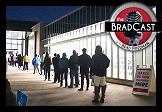 While voters were at the polls for primary elections in six states (Arizona, Kansas, Ohio, Michigan, Missouri and Washington) on Tuesday, we take the moment to turn to foreign affairs for a hot minute on today's BradCast.
While voters were at the polls for primary elections in six states (Arizona, Kansas, Ohio, Michigan, Missouri and Washington) on Tuesday, we take the moment to turn to foreign affairs for a hot minute on today's BradCast.
Happily, few problems were reported for voters at the polls in those six states --- at least that we could find so far today --- beyond another predictable failure of electronic poll books, this time across Mohave County, AZ, for about six hours when polls opened. More issues may reveal themselves before tomorrow, or thereafter, of course. Meanwhile, there are a whole bunch of far-right, Trump-backed, 2020 election deniers on the ballot today, with several running for critical offices such as Governor, Sec. of State and the U.S. Senate. All of which, if those candidates win on Tuesday and again this November, could cause very serious problems for democracy itself in 2024. We'll pick all of that up on tomorrow's show, with whatever noteworthy reported results may be available by then.
But today, we had the opportunity circle back to Russia's ongoing war with it's sovereign neighbor Ukraine, now entering it's sixth horrific month following Russia's invasion on February 24. If you follow most Western media, Ukraine's military is making valiant if deadly headway in pushing back at over-extended and exhausted Russian troops in the South, while Russia presses its offensive in the East.
If you follow Kremlin-controlled media, this is a war special military operation that can never be won by Ukraine, and continues to threaten expansion into a global conflict, including the use of nuclear weapons, as Russia takes great pains to note --- on an alarmingly regular basis.
But, it's not only Russian-controlled media suggesting the war is ultimately unwinnable for Ukraine. A number of foreign policy-centered Western media outlets and think-tanks have long argued similarly in a push for peace talks and a ceasefire in the now war-torn nation of Ukraine.
There was some good news this week, in that an agreement brokered by Turkey and the U.N. between the two warring nations last month has resulted in ships carrying Ukrainian grain finally able to leave port to deliver food around the world. Russian ships will also be allowed to do so through safe corridors established amid mined waters in the Black Sea. If the agreement holds, millions of tons of grain and other agricultural products will finally be able to flow from "the breadbasket of Europe" to help ease rising global food prices and the threat of hunger and political instability in developing nations.
The first ship to leave port on Monday was "loaded with two commodities in short supply: corn and hope," as U.N. Secretary-General Antonio Guterres described it. Beyond that, there is not much to be hopeful about in the protracted conflict.
Writing at The National Interest over the weekend, veteran foreign policy experts and former U.S. National Security officials Steven Simon and Jonathon Stevenson made the case for diplomacy. They called on the U.S. to help encourage a negotiated settlement by making clear to Ukraine that "Neither side can fulfill its maximal war aims" and they must find opportunities for peace talks and, if possible, a cessation of hostilities, despite Vladimir Putin's apparent disinclination to negotiate.
"It is well and good for the United States and its NATO allies to keep arming Ukraine. But it is also time to encourage both sides to start exploring possibilities for a political solution before escalation puts diplomacy even farther from reach," the pair conclude. "And unless the United States and NATO condition military assistance on Ukraine’s constructive political engagement, they will lack the leverage to work effectively towards a stable objective."
But is such a demand appropriate or even possible under the current conditions in the war torn nation? Isn't it up to Ukraine --- which has lost so much in blood, treasure and sovereign territory --- not the U.S. or NATO, to decide when and if Ukraine is ready to negotiate an end to the war?
Those are just some of the difficult and nuanced questions we discuss with our guest today, GEORGE BEEBE, Director of Grand Strategy (yes, I know, an ominous sounding title!) at the Quincy Institute for Responsible Statecraft, one of our go-to think-tanks for smart, no-nonsense foreign policy solutions.
Beebe's is the author of 2019's The Russia Trap: How Our Shadow War with Russia Could Spiral into Nuclear Catastrophe. He served over two decades in the U.S. government as an intelligence analyst, diplomat, and policy advisor, including as director of the CIA’s Russia analysis and as an advisor on Russia to Vice President Dick Cheney. (Yes, we discuss both of those ominous matters --- his work with the CIA and for Cheney --- as well!)
Among the questions and issues Beebe speaks to today: His concern that there is no real exit plan for our current strategy, not unlike the lack of a U.S. plan when we launched the Iraq War in 2003; Is it true that there is no way for Ukraine to "win" this war? That the only way is via diplomacy?; Should it be up to the U.S. and NATO, who are supplying much-needed armaments to help Ukraine defend itself, to decide when Ukraine should negotiate towards a settlement? Or should that remain Ukraine's sole decision?; Does Russia even have an interest in negotiations?; What should we learn from their repeated reminders that a continuation of the war could lead to a potentially nuclear expansion?; And, since it's actually a somewhat related matter, what does Beebe make of House Speaker Nancy Pelosi's controversial visit on Tuesday to Taiwan, and what effect is that likely to have on the Russia/Ukraine conflict?
"This is a very complex issue," Beebe tells me on the matter of the United States' own culpability in the matter. "Most foreign policy issues don't have single factor origins. They're usually the result of a confluence of different forces. What's happened in Russia's invasion of Ukraine is that it is the culmination of a series of developments, missteps on the part of a lot of different players over time, that all contributed to the situation that we're facing today."
"That doesn't excuse the Russians and it doesn't excuse Putin from making the choice to invade Ukraine. I think he is fully responsible for that choice, regardless of what preceded it. It didn't have to happen," he argues. But "Russia certainly has what I regard as understandable security concerns...That doesn't mean that the invasion was justified [or] that the manner in which this operation was carried out was at all justifiable."
"But I also would not say that Putin simply woke up in February and said, 'Hey, I would like to invade Ukraine.' There was a lot that went into shaping that decision, and I think a lot of blame on both the Russian and the Western sides."
As you can tell, there is much to discuss and try to make sense of with the Director of Grand Strategy at the Quincy Institute today. I hope you'll tune in for it!
Finally, Desi Doyen joins us today for our latest Green News Report, with more on the potentially "game changing" compromise bill hashed out by Senator Joe Manchin with Senate Majority leader Chuck Schumer last week, to invest an historic $370 billion in incentives to help us move from fossil fuels to clean, renewable energy in hopes of mitigating our worsening climate emergency; And, on the latest deadly costs of that ongoing emergency across the U.S., as Big Oil --- whose product, and decades of lies about it, are at the heart of the crisis --- declare their most profitable quarter in history...
(Snail mail support to "Brad Friedman, 7095 Hollywood Blvd., #594 Los Angeles, CA 90028" always welcome too!)
|


 The GOP 'Voter Fraud'
The GOP 'Voter Fraud' 'Green News Report' 10/31/24
'Green News Report' 10/31/24
 'Closing Arguments'
'Closing Arguments' Trump Promises to be a Lawless, Authoritarian President. Believe Him: 'BradCast' 10/29/24
Trump Promises to be a Lawless, Authoritarian President. Believe Him: 'BradCast' 10/29/24 'Green News Report' 10/29/24
'Green News Report' 10/29/24 Election Heats Up: Ballots Burn, Billionaires 'Obey in Advance', Callers Ring In: 'BradCast' 10/28/24
Election Heats Up: Ballots Burn, Billionaires 'Obey in Advance', Callers Ring In: 'BradCast' 10/28/24 Musk's Privatized Internet Satellite System Threatens U.S. National Security
Musk's Privatized Internet Satellite System Threatens U.S. National Security Sunday 'VOTE NOW!' Toons
Sunday 'VOTE NOW!' Toons Harris on Hope, Trump's Fasc-ism in Bumpy Closing Days: 'BradCast' 10/24/24
Harris on Hope, Trump's Fasc-ism in Bumpy Closing Days: 'BradCast' 10/24/24 'Green News Report' 10/24/24
'Green News Report' 10/24/24 Kelly on Trump: 'Fascist', Admires Hitler, Disrespects Constitution and Disabled Vets: 'BradCast' 10/23/24
Kelly on Trump: 'Fascist', Admires Hitler, Disrespects Constitution and Disabled Vets: 'BradCast' 10/23/24 Accountability Comes For Rudy, Other Election Deniers: 'BradCast' 10/22/24
Accountability Comes For Rudy, Other Election Deniers: 'BradCast' 10/22/24 'Green News Report' 10/22/24
'Green News Report' 10/22/24 Elon Musk's 'Vote Buying' and Lying for Trump: 'BradCast' 10/21/24
Elon Musk's 'Vote Buying' and Lying for Trump: 'BradCast' 10/21/24 Sunday 'High Anxiety' Toons
Sunday 'High Anxiety' Toons 'Green News Report' 10/17/24
'Green News Report' 10/17/24 Fake v. Real Censorship and Trump/Fox Fetish-ized Grievance World: 'BradCast' 10/17/24
Fake v. Real Censorship and Trump/Fox Fetish-ized Grievance World: 'BradCast' 10/17/24 'Americans Aren't Prepared for Trump's Police State': 'BradCast' 10/16/24
'Americans Aren't Prepared for Trump's Police State': 'BradCast' 10/16/24 Good News for Georgia Voters, the Economy and Kamala Harris: 'BradCast' 10/15/24
Good News for Georgia Voters, the Economy and Kamala Harris: 'BradCast' 10/15/24 Fascism Comes to America: 'BradCast' 10/14/24
Fascism Comes to America: 'BradCast' 10/14/24 Institutional Landlords Flood CA Voters With Deceptive Ads on Props 33 and 34
Institutional Landlords Flood CA Voters With Deceptive Ads on Props 33 and 34 Milton's Mess, FL's U.S. House Liars, Trump's Made-in-China Bibles: 'BradCast' 10/10/24
Milton's Mess, FL's U.S. House Liars, Trump's Made-in-China Bibles: 'BradCast' 10/10/24 Whistleblower Org Readies to Support Election Officials: 'BradCast' 10/9/24
Whistleblower Org Readies to Support Election Officials: 'BradCast' 10/9/24 Florida Braces for 'Devastating to Catastrophic' Milton: 'BradCast' 10/8/24
Florida Braces for 'Devastating to Catastrophic' Milton: 'BradCast' 10/8/24
 VA GOP VOTER REG FRAUDSTER OFF HOOK
VA GOP VOTER REG FRAUDSTER OFF HOOK Criminal GOP Voter Registration Fraud Probe Expanding in VA
Criminal GOP Voter Registration Fraud Probe Expanding in VA DOJ PROBE SOUGHT AFTER VA ARREST
DOJ PROBE SOUGHT AFTER VA ARREST Arrest in VA: GOP Voter Reg Scandal Widens
Arrest in VA: GOP Voter Reg Scandal Widens ALL TOGETHER: ROVE, SPROUL, KOCHS, RNC
ALL TOGETHER: ROVE, SPROUL, KOCHS, RNC LATimes: RNC's 'Fired' Sproul Working for Repubs in 'as Many as 30 States'
LATimes: RNC's 'Fired' Sproul Working for Repubs in 'as Many as 30 States' 'Fired' Sproul Group 'Cloned', Still Working for Republicans in At Least 10 States
'Fired' Sproul Group 'Cloned', Still Working for Republicans in At Least 10 States FINALLY: FOX ON GOP REG FRAUD SCANDAL
FINALLY: FOX ON GOP REG FRAUD SCANDAL COLORADO FOLLOWS FLORIDA WITH GOP CRIMINAL INVESTIGATION
COLORADO FOLLOWS FLORIDA WITH GOP CRIMINAL INVESTIGATION CRIMINAL PROBE LAUNCHED INTO GOP VOTER REGISTRATION FRAUD SCANDAL IN FL
CRIMINAL PROBE LAUNCHED INTO GOP VOTER REGISTRATION FRAUD SCANDAL IN FL Brad Breaks PA Photo ID & GOP Registration Fraud Scandal News on Hartmann TV
Brad Breaks PA Photo ID & GOP Registration Fraud Scandal News on Hartmann TV  CAUGHT ON TAPE: COORDINATED NATIONWIDE GOP VOTER REG SCAM
CAUGHT ON TAPE: COORDINATED NATIONWIDE GOP VOTER REG SCAM CRIMINAL ELECTION FRAUD COMPLAINT FILED AGAINST GOP 'FRAUD' FIRM
CRIMINAL ELECTION FRAUD COMPLAINT FILED AGAINST GOP 'FRAUD' FIRM RICK SCOTT GETS ROLLED IN GOP REGISTRATION FRAUD SCANDAL
RICK SCOTT GETS ROLLED IN GOP REGISTRATION FRAUD SCANDAL VIDEO: Brad Breaks GOP Reg Fraud Scandal on Hartmann TV
VIDEO: Brad Breaks GOP Reg Fraud Scandal on Hartmann TV RNC FIRES NATIONAL VOTER REGISTRATION FIRM FOR FRAUD
RNC FIRES NATIONAL VOTER REGISTRATION FIRM FOR FRAUD EXCLUSIVE: Intvw w/ FL Official Who First Discovered GOP Reg Fraud
EXCLUSIVE: Intvw w/ FL Official Who First Discovered GOP Reg Fraud GOP REGISTRATION FRAUD FOUND IN FL
GOP REGISTRATION FRAUD FOUND IN FL


































